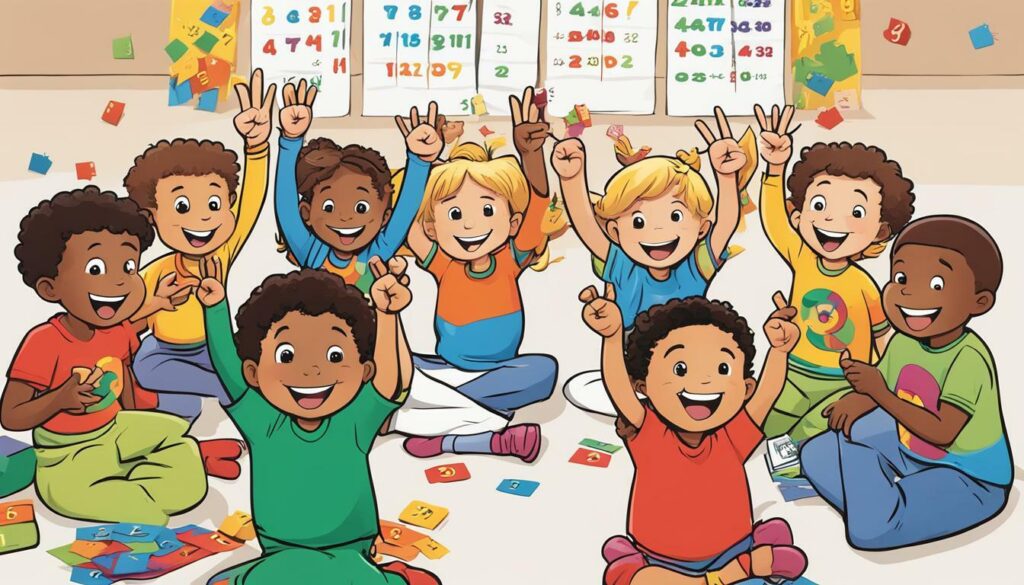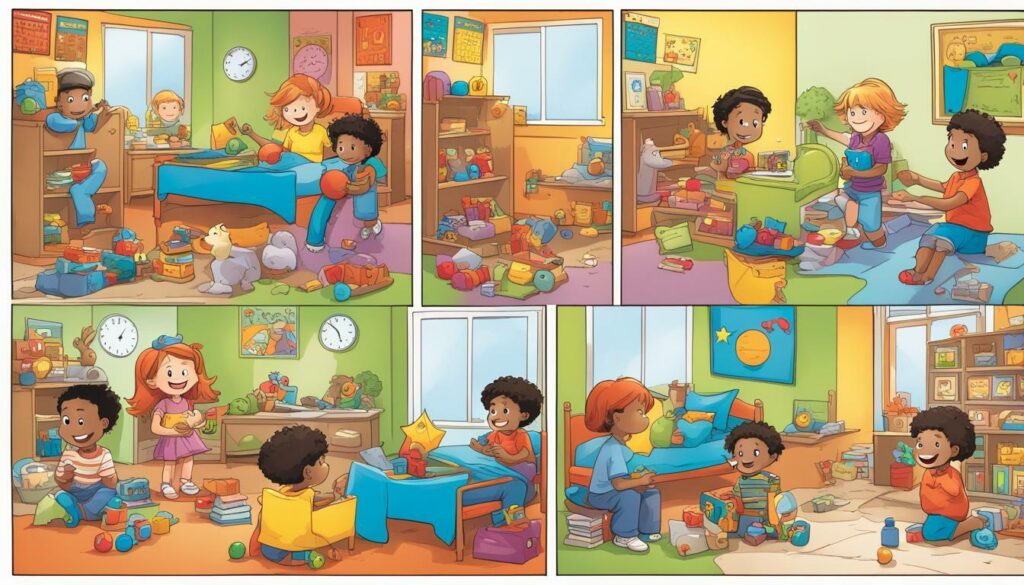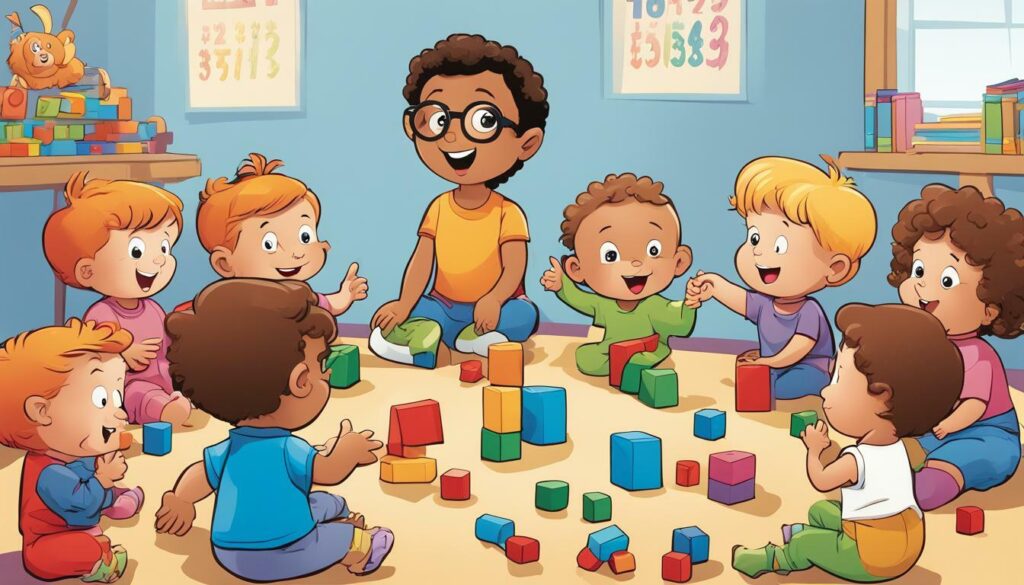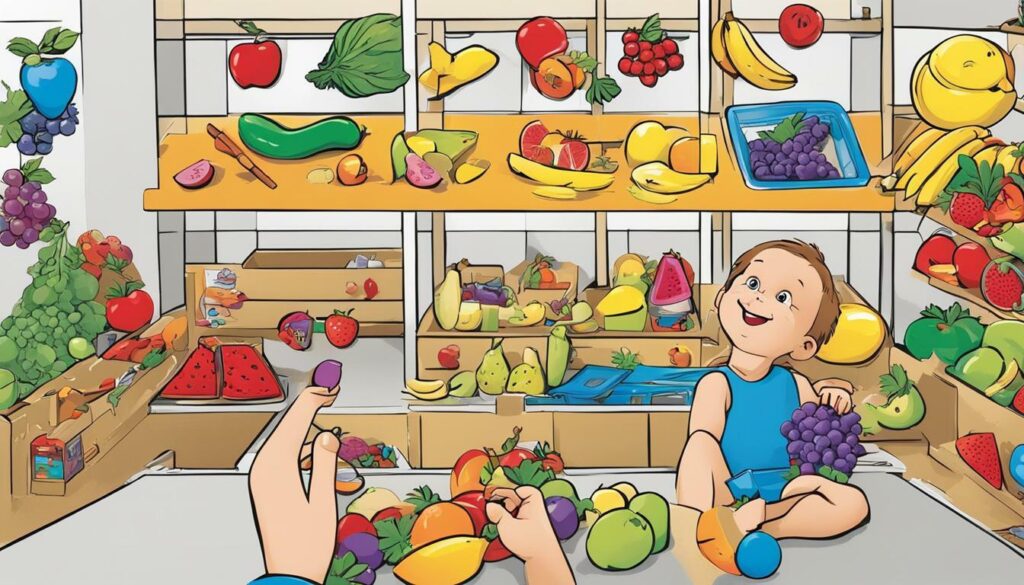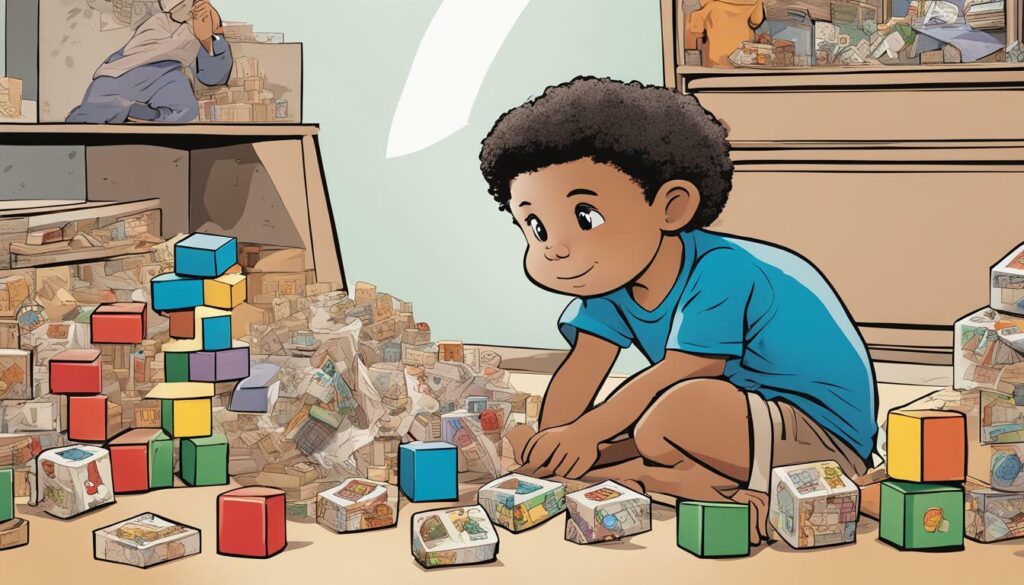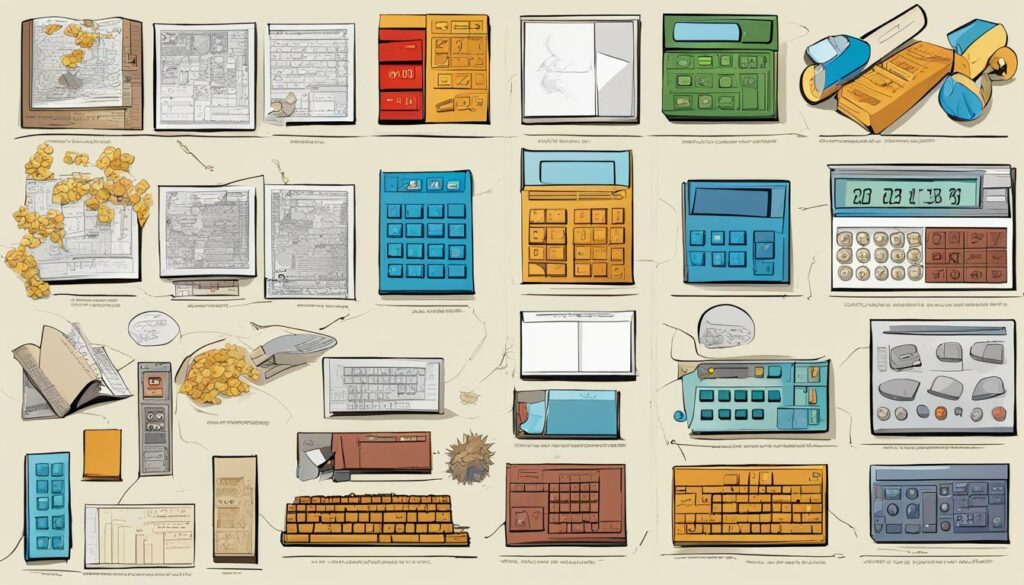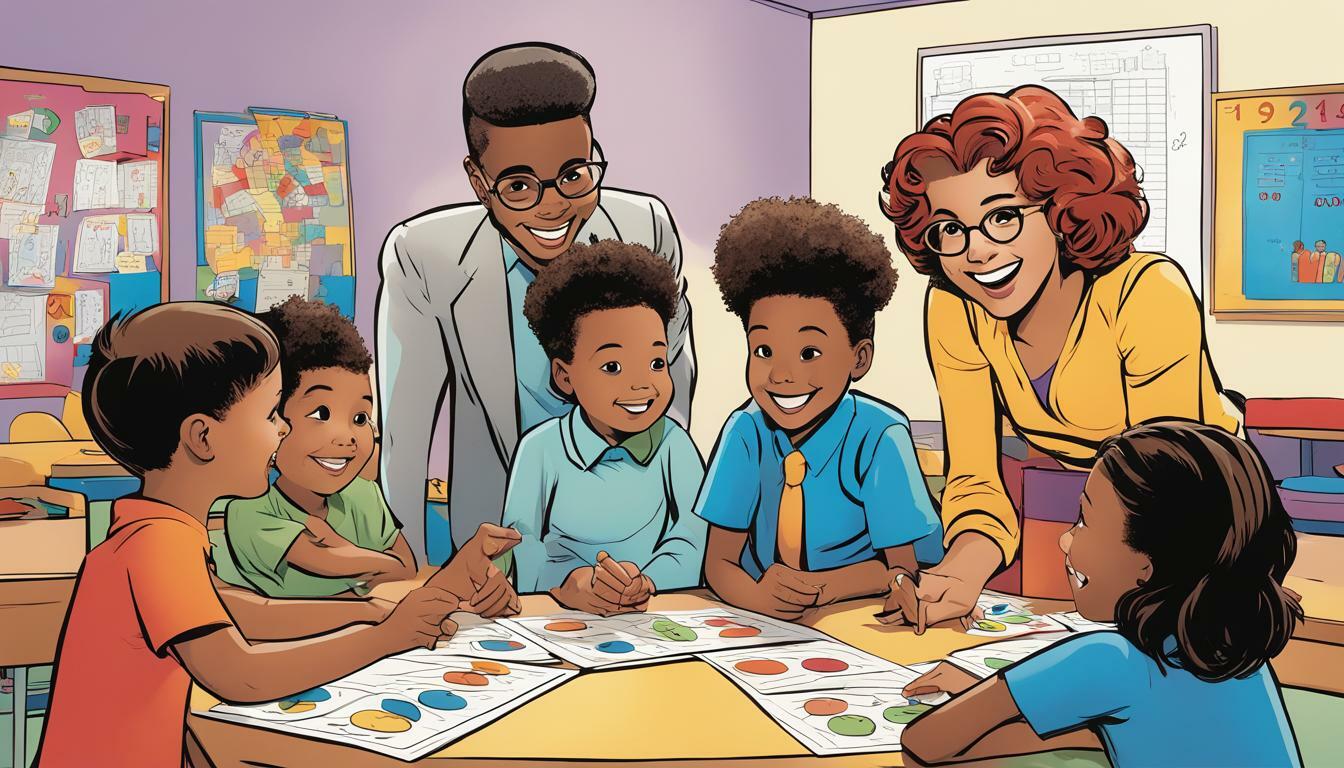
Welcome to my comprehensive guide on when kids can typically count to 10. In this section, we will discuss the typical age range at which children develop the ability to count to 10. We will also explore the factors that influence counting skills and the importance of early number recognition in cognitive development.
Key Takeaways:
- Children typically develop the ability to count to 10 between the ages of two and four years old.
- Early number recognition and exposure to counting activities can support and enhance a child’s counting skills.
Understanding Counting Skills in Children
Counting is an essential cognitive skill that develops in children as they grow. As a parent, it is important to understand the different stages of counting skills in children to provide appropriate support. In this section, we will explore the relationship between counting skills and cognitive development, including the progression from rote counting to understanding the concept of quantity.
The Stages of Counting Skills in Children
According to research, counting skills in children develop in several stages. These stages include:
- Rote counting: Children learn to recite numbers in sequence, often without understanding the meaning behind them. This usually begins around age 2.
- One-to-one correspondence: This is when children start to understand that each number they say represents one item. For example, they can count four toy cars and understand that there are four cars.
- Understanding quantity: This is when children learn to associate a number with a specific quantity. They can identify that four is more than three, for example, and understand basic addition and subtraction.
- Counting on: At this stage, children can count on from any number and understand that numbers can be added together to create a sum. They can also count backwards from a given number.
Each stage of counting skills builds on the previous one, and children typically reach these milestones at different ages. By understanding these stages, parents can provide appropriate support and activities to help their child develop counting skills.
The Relationship Between Counting and Cognitive Development
Counting skills are closely linked to cognitive development in children. The ability to count requires memory, attention, and problem-solving skills, all of which are important in other areas of learning.
Research has shown that children who have strong counting skills early on tend to perform better in math and other academic subjects later in school. This is because counting skills help with the development of logical thinking and problem-solving abilities.
Parents can support their child’s cognitive development by providing opportunities for counting and number recognition. This can include counting games, puzzles, and activities that involve numerical sequencing.
Overall, understanding counting skills in children is essential for supporting their cognitive development. By providing appropriate activities and support, parents can help their child reach important counting milestones and lay the foundation for success in math and other academic subjects.
Early Number Recognition in Children
As a copywriting journalist, I understand the importance of early number recognition in children’s cognitive development. Numerical abilities in kids develop gradually and are a crucial foundation for various academic subjects, such as math and science.
Early number recognition refers to a child’s ability to recognize and identify numbers, usually from 1 to 10, before they can count or perform basic math operations. This skill is crucial because it helps children understand the concept of quantity, which is necessary for counting and other math concepts.
To develop early number recognition in children, parents can incorporate number recognition activities into their daily routines. For example, they can point out numbers in their environment, such as on street signs or grocery items, or play number recognition games with their child. These activities help children develop numerical abilities and prepare them for counting.
Research shows that early number recognition is closely linked to future math success. Children who develop this skill early on are more likely to perform better in math-related subjects throughout their academic careers.
Overall, early number recognition is an essential component of children’s cognitive development. By incorporating fun and engaging activities into their daily routine, parents can support their child’s numerical abilities and set them up for success in academics and beyond.
Milestones in Counting for Kids
As children develop their counting skills, they reach a number of milestones that indicate their progress. These milestones are essential for building a strong foundation in math and cognitive development. Let’s take a closer look at some of the key milestones in counting for kids.
| Milestone | Age |
|---|---|
| Rote counting | 2-3 years old |
| Counting objects | 3-4 years old |
| Counting in sequence | 4-5 years old |
Rote counting refers to the ability to recite numbers in the correct order, but without necessarily understanding their meanings. This milestone typically occurs around 2-3 years of age.
Counting objects involves the ability to match numbers to a set of objects and recognize quantity. Children around 3-4 years old are typically able to count a set of objects up to 10.
Counting in sequence is the ability to count forward and backward in sequence, and to recognize and write numbers. This milestone typically occurs around 4-5 years of age and is crucial for future math skills.
It’s important to keep in mind that these milestones are generalizations, and children may develop counting skills at different rates. However, by recognizing these milestones, parents and caregivers can support and encourage their child’s counting skills as they grow and develop.
When Can Toddlers Count to Ten?
If you’re wondering when your child will be able to count to ten, you’re not alone. Many parents are eager to see their little ones start to develop their counting skills. So, when can toddlers count to ten?
Typically, toddlers who are around two and a half to three years old will begin to count to ten. However, every child is different, and some may start counting earlier or later than others. It’s important to remember that counting is a skill that takes time to develop, so be patient with your child as they learn.
One factor that can influence when your child starts counting is exposure to numbers. If you incorporate counting into your daily routines, such as counting the number of apples at the grocery store or the number of steps on your walk, your child will have more opportunities to practice their counting skills.
Another important factor is your child’s level of cognitive development. Counting requires not only the ability to recite numbers in sequence but also an understanding of quantity and number value. As your child’s cognitive skills develop, they will be better able to grasp these concepts.
It’s also worth noting that counting is just one aspect of early math skills. As your child grows and develops, they will need to build on their counting skills to learn more complex math concepts.
In conclusion, toddlers typically begin counting to ten around the age of two and a half to three years old. However, the development of counting skills can vary based on individual factors. By exposing your child to numbers and supporting their cognitive development, you can help them build a strong foundation for their math skills.
Techniques for Teaching Counting to Kids
In order to help children develop strong counting skills, it’s important to use a variety of techniques that cater to their individual learning styles. Here are some effective counting techniques for kids:
1. Counting with Objects
One of the best ways to introduce counting to children is by using objects that they can physically touch and count. This can include anything from toy cars to small pieces of food. Encourage your child to count out loud as they touch each object. This helps them develop a better understanding of the concept of quantity.
| PRO TIP | For younger children, use objects that are easy to count and manipulate, such as large beads or blocks. |
|---|
2. Counting Songs and Rhymes
Children love music, and counting songs and rhymes can be a fun way to help them remember numbers. For example, you can sing “Ten Little Monkeys Jumping on the Bed” with your child, or teach them the classic “One, Two, Buckle My Shoe” rhyme. These songs and rhymes help children remember the order of numbers and reinforce counting concepts.
3. Counting Games
Playing counting games is an excellent way to make learning fun and engaging. You can create your own counting games using dice, cards, or a simple board game. Or, you can find online counting games that your child can play on a computer or tablet. These games help children practice counting in a relaxed and enjoyable setting.
4. Counting in Everyday Life
Counting opportunities are all around us in everyday life. Encourage your child to count the number of stairs as you climb them, the number of apples in the grocery store, or the number of birds they see outside. These real-life examples help children see the practical application of counting and reinforce their skills.
By using a combination of these techniques, parents can help their children develop strong counting skills that will serve them well in school and beyond.
Cognitive Development and Counting
Counting is not just about recognizing numbers and counting objects, it also involves various cognitive processes that contribute to overall cognitive development in children. Through counting, children develop their memory, attention, and fine motor skills. It also helps them understand the concept of quantity and develop problem-solving skills.
Studies have shown that children who acquire strong counting skills at an early age tend to perform better in mathematics and other subjects later in school. Counting also helps children develop critical thinking and reasoning skills, which are crucial for success in all areas of life.
When children count objects, they are practicing their memory and attention skills by remembering the number sequence and focusing on each object to ensure they count correctly. They are also developing their fine motor skills by using their fingers or other tools to point to each object as they count.
As children progress in counting, they start to understand the concept of quantity. They learn that the number 3 means three objects or three actions. This understanding of quantity is crucial for later math skills, such as addition and subtraction.
Overall, counting is a vital skill that contributes to a child’s cognitive development. As parents and caregivers, we can support their counting skills by providing opportunities for counting and using practical techniques to enhance their skills.
Using games and activities that involve counting can make learning fun and engaging for children. For example, counting objects during a car ride or while grocery shopping can help children practice their counting skills in real-life situations.
As children progress in their counting skills, it’s important to challenge them with more complex tasks, such as counting backwards or counting objects that are not in a straight line. These challenges help children develop problem-solving skills and foster a love of learning.
In summary, counting is not just a basic skill, but a crucial part of cognitive development for children. By supporting their counting skills, we can help them succeed in all areas of life.
Developmental Stages in Counting Skills
Children’s ability to count develops over time, through different stages. Understanding these developmental stages can help parents and caregivers better support their children’s counting skills. Let’s explore these stages:
Stage 1: Rote Counting (Ages 1-2)
During this stage, toddlers learn to recite numbers in order, often without understanding the concept of quantity. They may count to 10 or even higher, but struggle to connect numbers with objects or understand that the last number said represents the total quantity.
Activities that can support this stage include counting games, songs, and nursery rhymes that promote number recognition and repetition.
Stage 2: One-to-One Correspondence (Ages 3-4)
During this stage, children begin to understand that each number represents a specific quantity. They learn to connect numbers with objects, using one-to-one correspondence. For example, they might touch each object while counting to ensure they don’t miss any and don’t count any twice.
Activities that support this stage include counting objects in the environment, such as toys or snacks, and asking children to count how many they have or how many are left when some are removed.
Stage 3: Understanding Quantity (Ages 4-5)
During this stage, children begin to understand the concept of quantity. They learn that counting represents how many objects there are. They also learn how to count groups of objects, such as counting five blocks as one group instead of five individual blocks.
Activities that support this stage include asking children to count groups of objects and asking them to identify which group has more or fewer objects.
By understanding these developmental stages, parents and caregivers can provide appropriate support and activities to help children progress in their counting skills. Remember to make it fun and engaging for the child, so they can enjoy learning and developing their cognitive abilities.
Conclusion
Counting is a fundamental skill that children need to develop in their early years. As we have discussed throughout this article, there are several developmental stages in counting skills, and children typically begin to count to ten between the ages of two and four.
Parents and caregivers can play an important role in nurturing children’s counting abilities by providing them with opportunities to practice counting and by using effective teaching techniques such as modeling, repetition, and hands-on activities. Early number recognition is also crucial for children’s cognitive development and sets the foundation for future math skills.
Remember, every child is different, and there is no one-size-fits-all approach to teaching counting. However, by understanding the developmental stages of counting and being patient and supportive, parents and caregivers can help children master this essential skill.
By fostering children’s counting skills, we are also promoting their overall cognitive development, which can have lifelong benefits. So let’s encourage our little ones to count, explore, and learn!
FAQ
Q: At what age can kids count to 10?
A: Children typically develop the ability to count to 10 between the ages of 2 and 3. However, the exact age can vary from child to child. It’s important to remember that counting skills develop gradually and require practice and reinforcement.
Q: What factors influence counting skills in children?
A: Counting skills in children can be influenced by various factors, including exposure to numbers, verbal encouragement, and opportunities for hands-on counting activities. Additionally, a child’s cognitive development and individual learning style may play a role in their counting abilities.
Q: Why is early number recognition important in children?
A: Early number recognition is important in children because it forms the foundation for counting skills. By recognizing numbers and their corresponding quantities, children can begin to understand the concept of counting and develop numerical abilities that are essential for future mathematical understanding.
Q: What are the milestones in counting for kids?
A: Children reach several milestones in their counting abilities. These milestones include:
– Rote counting: Children learn to recite numbers in order without understanding their meaning.
– One-to-one correspondence: Children learn to pair each object with one number word.
– Counting in sequence: Children can count objects in the correct order.
– Counting with understanding: Children understand that the last number counted represents the quantity of objects.
Q: When do toddlers typically count to ten?
A: Toddlers typically develop the ability to count to ten between the ages of 2 and 3. However, each child develops at their own pace, so the exact age may vary. It’s important to provide opportunities for counting practice and support their learning as they progress.
Q: What are some techniques for teaching counting to kids?
A: There are several effective techniques for teaching counting to children, including:
– Using visual aids: Use objects, pictures, or number cards to help children visualize quantities.
– Singing counting songs: Singing songs that involve counting can make learning more engaging.
– Incorporating counting into daily activities: Count objects during playtime, mealtimes, or while out and about.
– Playing counting games: Engage children in fun games that involve counting, such as scavenger hunts or counting objects in a room.
Q: How does counting contribute to cognitive development?
A: Counting skills play a significant role in cognitive development. Counting requires children to use their memory, attention, and problem-solving abilities. It helps them develop spatial awareness, number sense, and logical thinking skills, which are important for overall learning and academic success.
Q: What are the different developmental stages in counting skills?
A: Counting skills develop in various stages, including:
– Rote counting: Children learn to recite numbers in order without understanding their meaning.
– One-to-one correspondence: Children learn to pair each object with one number word.
– Counting in sequence: Children can count objects in the correct order.
– Counting with understanding: Children understand that the last number counted represents the quantity of objects. They can also count groups of objects and perform simple addition and subtraction with numbers.

